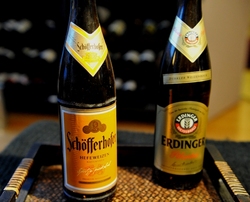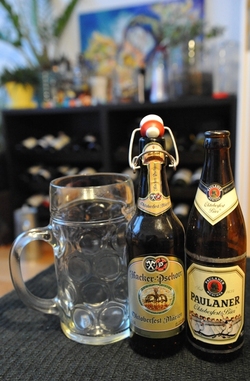The Final Weißbier 1st Round - Weißbier vs Oktoberfest
 Friday, February 18, 2011 at 9:00
Friday, February 18, 2011 at 9:00 As we mentioned before, this beer tournament is not a truly scientific study...it's based on the beer selection in my two closest grocery stores. While we didn't have 16 weißbiers, there wasn't room to include the 4 Dunkles Weißbier in there either. So we made the executive decision to sprinkle in some Oktoberfest beers throughout the bracket and to put the Dunkles Weißbier in the Dunkel category.
Therefore, this first round is a bit odd. We start with our final two Weißbiers - Schöfferhofer Hefeweizen Naturtrüb and Erdinger Pikantus Dunkler Weizenbock. These two were separated from the others as we were not sure if the names denoted something different than a typical Weißbier. In German, "Weißbier" technically means "white beer," not "wheat beer," though it is a wheat bear. Legend has it that it was brewed back in the middle ages and was the lighter colored beer compared to the traditional darker beer. "Weizenbier" does explicitly mean "Wheat Beer" and "Hefe Weizen" means "Yeast Wheat beer". As suspected, they are all the same - top fermented beers made with 50%-65% wheat malt, vs the 100% barley malt in the others. (The remaining 35-50% in a weißbier will still be barley).
In fact, "Weißbier" is the name most commonly used in Bavaria, the region where it is most loved and brewed. (As a good Bavarian, the Pope has publicly stated weißbier as his preferred beer style, though we know he drinks other varieties as well).
Some beer books refer to "Southern German Weißbier" as a style, though effectively it's the same as a Hefeweizen, a Weizenbier, or a wheat beer in brewing style. A filtered Weizen would be a Kristalweizen, exactly the same as the Kristallklar Weißbier we tried. For some reason, the US and other non-German wheat beers often use the term Hefeweizen.
 So, the Schöfferhofer is a normal Weißbier, though our one non-Bavarian weißbier in the mix. From the largest brewery in Hesse, it's brewed by the Binding Brewery, part of the Radeberger Group. In addition to the normal selection of Kristal, Naturtrüb, Dunkel, and Alcohol-free, Schöfferhofer also brews an Eis-Kristall (yes, an ice-brewed, filtered wheat beer) and a two varieties of super-tasty flavored wheat beers. Herr J had both the Grapefruit and Cactus-Fig in his Beer Advent Calendar.
So, the Schöfferhofer is a normal Weißbier, though our one non-Bavarian weißbier in the mix. From the largest brewery in Hesse, it's brewed by the Binding Brewery, part of the Radeberger Group. In addition to the normal selection of Kristal, Naturtrüb, Dunkel, and Alcohol-free, Schöfferhofer also brews an Eis-Kristall (yes, an ice-brewed, filtered wheat beer) and a two varieties of super-tasty flavored wheat beers. Herr J had both the Grapefruit and Cactus-Fig in his Beer Advent Calendar.
The Erdinger Pikantus, on the other hand, was a Weizenbock, so we expected it to be darker and stronger than a typical weißbier. We weren't sure how it compared to the Dunkel Weißbier, however, as Erdinger also makes one of those.
As expected, the Erdinger was darker, stronger, and with spicier flavors. It also had a much larger head on the beer. The Schöfferhofer had an excellent clovey, traditional weißbier taste. But in terms of taste, the Erdinger just was more interesting and tasty. If we were looking for a beer we could drink all night, we'd order the Schöfferhofer. However, as this is a single elimination tournament, we awarded the win to Erdinger for just tasting better. It would be hard to drink it all night, as it does have a strong flavor. And at 7.3% alcohol content, I'd quickly fall off my bar stool.
 The next two competitors in this round are the final two Oktoberfest beers in this tournament. We already tried three others - Hofbrau, Spaten, and Löwenbräu - bringing us to a total of 5 out of 6 of the "Sechs Richtige" Munich Oktoberfest beers. (Augustiner is the 6th, but it reserves its seasonal beers for sale in its restaurants). Both the Hacker-Pschorr and the Paulaner produced good Oktoberfest brews. For the first time in our tournment, Paulaner failed to advance. It was a close competition, but we liked the slightly darker Hacker-Pschorr märzen.
The next two competitors in this round are the final two Oktoberfest beers in this tournament. We already tried three others - Hofbrau, Spaten, and Löwenbräu - bringing us to a total of 5 out of 6 of the "Sechs Richtige" Munich Oktoberfest beers. (Augustiner is the 6th, but it reserves its seasonal beers for sale in its restaurants). Both the Hacker-Pschorr and the Paulaner produced good Oktoberfest brews. For the first time in our tournment, Paulaner failed to advance. It was a close competition, but we liked the slightly darker Hacker-Pschorr märzen.
How, then, did the Weizenbock stack up against the Märzen? The Hacker-Pschorr was very pleasant and malty, but the caramel taste of the Erdinger Pikantus was a much better taste. It really is just a matter of preference here - and we've realized we prefer the more complex beers, or the perfectly smooth, drinkable Helles. It will be interesting to see what happens when those two go head to head!

 Frau A ...
Frau A ...  Post a Comment
Post a Comment 




Reader Comments